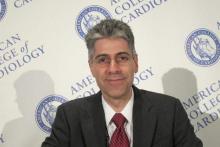SAN DIEGO– The investigational PCSK9 inhibitor evolucumab dramatically reduced the 1-year cardiovascular event rate, by 53%, compared with standard statin-based lipid-lowering in the randomized OSLER study.
This reduction in adverse cardiovascular events was accompanied by a robust 61% reduction in LDL compared with standard therapy. The LDL level in evolocumab-treated patients dropped from 120 mg/dL to an average of 48 mg/dL, Dr. Marc S. Sabatine reported at the annual meeting of the American College of Cardiology.
The safety profile of patients on evolocumab plus standard, statin-based lipid lowering was essentially the same as in controls on standard therapy alone. Moreover, no gradient was seen for any adverse events on the basis of the extent of LDL lowering. For example, the types and incidence of adverse events and laboratory abnormalities in the 773 evolocumab-treated OSLER participants with an achieved LDL less than 25 mg/dL were closely similar to those seen with an LDL above 40 mg/dL, according to Dr. Sabatine, chairman of the Thrombolysis In Myocardial Infarction Study Group at Brigham and Women’s Hospital in Boston.
“These data, in conjuction with epidemiological and genetic data, offer further support for the potential for PCSK9 inhibition as a safe and effective means to reduce major adverse cardiovascular outcomes through particularly robust LDL cholesterol lowering,” he added.
OSLER (Open-Label Study of Long-Term Evaluation against LDL Cholesterol) included 4,465 patients who had completed one of a dozen earlier phase II or III studies of evolucumab, a monoclonal antibody that inhibits proprotein convertase subtilisin kexin type 9 (PCSK9), and were then randomized 2:1 to 1 year of open-label evolucumab administered subcutaneously at either 140 mg every 2 weeks or 420 mg once monthly plus standard lipid-lowering, or to standard lipid-lowering alone, generally with moderate- or high-dose statins.
The PCSK9 inhibitor reduced LDL cholesterol by 73 mg/dL compared to the control arm. In addition, the evolocumab group experienced a 26% decrease in Lp(a), a 47% drop in ApoB, a 13% reduction in triglycerides, and a 7% rise in HDL relative to standard care.
The 1-year composite cardiovascular event rate was just 0.95% in the evolucumab group, a 53% reduction relative to the 2.18% rate in the control arm. The composite outcome was comprised of death, MI, stroke or TIA, hospitalization for heart failure, coronary revascularization, or hospitalization for unstable angina. The reduction in events seen with evolocumab was consistent across all the components of the composite outcome.
Rates of most adverse events were closely similar in the two study arms. The exception was self-reported neurocognitive events such as forgetfulness or confusion, where the 0.9% incidence in the evolucumab group, while quite low in an absolute sense, was nonetheless threefold higher than in controls.
While the OSLER findings are highly encouraging in terms of both efficacy and safety, the study was too small and too brief at 1 year to be considered definitive, especially in terms of cardiovascular event rates, of which there only 60 in total. All eyes are now on the ongoing 27,500-patient, randomized, placebo-controlled FOURIER (Further Cardiovascular Outcomes Research with PCSK9 Inhibition in Subjects with Elevated Risk) study. Participants in FOURIER must have a history of MI, stroke, or peripheral artery disease plus at least one additional high-risk feature. Results are expected in 2017.
Similar massive pivotal phase III studies of two other highly promising PCSK9 inhibitors – alirocumab and bococizumab – are ongoing. The PCSK9 inhibitors were the talk of ACC 2015 in light of the mounting impressive safety and efficacy data. The Food and Drug Administration is now considering whether to approve PCSK9 inhibition for patients with familial hypercholesterolemia whose LDL is not adequately controlled by statins, with a decision expected later this year.
Discussant Dr. Christopher P. Cannon called OSLER “a terrific study.”
The OSLER findings, coupled with a previously reported preliminary analysis suggesting reduced cardiovascular events in clinical trials of alirocumab, provide strong support for the notion that the lower the achieved LDL – whether accomplished by statins or other agents – the greater the cardiovascular benefit.
“This is so exciting. Lowering cholesterol is definitely a passion of mine,” said Dr. Cannon, professor of medicine at Harvard Medical School, Boston.
Discussant Dr. Judith S. Hochman was equally enthusiastic about the OSLER outcomes.
“This is really impressive and very encouraging for this class of cholesterol-lowering agents. And I want to congratulate you for enrolling 50% women. But we need more study about the potential for neurocognitive events,” commented Dr. Hochman, professor of cardiology and senior associate dean for clinical sciences at New York University.



